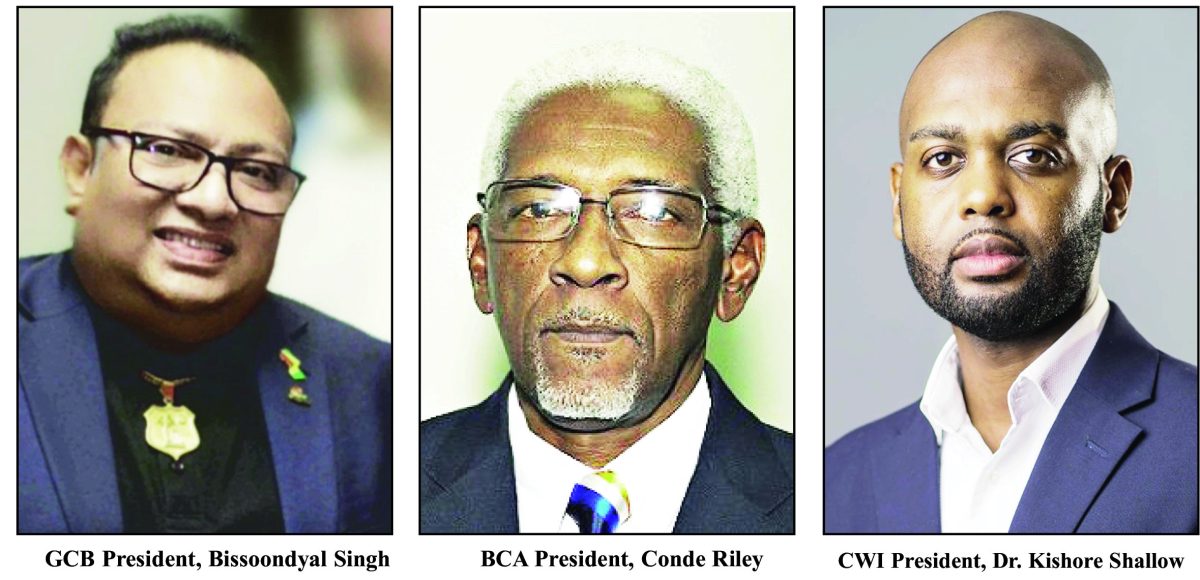Cricket West Indies’ (CWI) ambitious governance reform plans were dealt a significant blow as the Barbados Cricket Association (BCA) and the Guyana Cricket Board (GCB) opted out of a pivotal meeting yesterday, effectively stalling progress.
The absence of these two key shareholders meant the meeting, convened to discuss and vote on proposed amendments rooted in the Wehby Report, failed to reach quorum.
The reforms, including extending the President and Vice President’s term of office from two to three years and introducing structural governance changes, were designed to modernize CWI’s framework and align it with global best practices. However, the BCA and GCB continue to voice their opposition, proposing alternative measures and questioning the benefits of the suggested changes.
In a joint statement, the BCA and GCB criticized the Wehby Report for its perceived aim to diminish the autonomy of territorial boards and expressed frustration at being sidelined in the decision-making process. The territorial boards highlighted the lack of a response to their previous proposals, including a rotational leadership model and a long-term development strategy aimed at reducing infighting and nepotism in the election of CWI executives. The BCA and GCB argued that the reforms presented by CWI lack clarity and fail to address the broader needs of the organization’s diverse stakeholders. They also cited concerns over the repeated introduction of elements from the Wehby Report, which they had previously rejected, labeling the efforts as dismissive of their historical contributions and governance roles.
Their decision to boycott the meeting underscores their dissatisfaction, with the BCA and GCB emphasizing the need for meaningful dialogue over top-down mandates.
Below are the reasons for the BCA and GCB’s alliance as extracted from their joint statement:
“1. There are and were no convincing reasons for BCA and GCB to support the sought changes/amendments to the Articles of the existing Memorandum & Articles of Association. Also, the proposed changes/amendments lack clarity in the form as presented and for that matter how they will benefit the Company in consideration of its multiple stakeholder base.
2. The BCA submitted proposals on two occasions to CWI with the latter not even receiving a response. Previously, at the twenty-fifth CWI Annual Meeting of Members, held on 23rd March 2024, the BCA proposal was to stop the infighting through electioneering at CWI and said proposal was supported by GCB. The current system for electing a President and Vice President provides for horse-trading and nepotism. The CWI proposed amendments do not include the BCA/GCB proposal as an option for members to discuss or vote on. CWI continues to ignore the voice’s of its shareholder reps and Full Members.
3. The BCA and GCB rejected the Wehby Report on the basis that it seeks to relinquish power from the territorial boards and is further seen given recent decisions at CWI. The repetitive meetings under the guise of corporate governance reform attempt to bring parts of said Wehby report which were previously rejected.
4. In recent years, the Secretariat of the Company has on occasions, either forgotten or ignored or failed to acknowledge the historical status of and the contribution made by its Full Members. Without want of curtailing zeal beyond boundaries, such habitual culture must reverse in the interest of progress.
5. The mandate to provide and maintain an independently operated dispute mechanism for complainants as required by certain existing Memorandum and Articles of Association of the Company (“the M&AA”) of the Company, the Code of Ethics of International Cricket Council (“the Code of Ethics of ICC”), and the Code of Ethics of the Company and the
Terms of Reference thereto.”
CWI disappointed
CWI President Dr. Kishore Shallow expressed dismay at the absence of representatives from Barbados and Guyana, calling it a missed opportunity for unity and collaboration. “This moment required unity and collaboration, and their absence undermines the collective effort required to move forward,” Shallow said.
Dr. Shallow stressed the urgency of governance reform as essential for the growth and sustainability of cricket in the Caribbean, framing the Wehby Report’s recommendations as a roadmap for progress. “Change is never easy, but it is absolutely necessary,” he added, reaffirming CWI’s commitment to implementing reforms.
The Wehby Report, commissioned in 2019, advocates for restructuring the Board of Directors, enhancing transparency, and aligning operations with international standards. While the report has faced delays—partly due to the COVID-19 pandemic—it remains central to CWI’s reform agenda.
Despite the setback, CWI has announced plans to seek written responses from its members on the proposed resolutions. The organization remains steadfast in its mission to modernize and improve governance. The impasse, however, highlights deeper divisions within the CWI structure, with territorial boards like the BCA and GCB demanding greater respect for their autonomy and historical contributions. Their counter proposals for rotational leadership and a long-term development plan reflect a contrasting vision for the future of West Indies cricket.
The Wehby Report is one in a series aimed at governance reforms that have been stymied over the years by territorial boards or the former West Indies Cricket Board.









